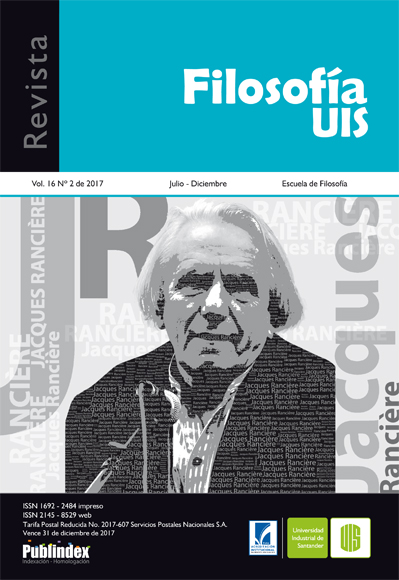The metaphor as an epistemic resource in Machiavelli’s The Prince
Published 2017-12-14
Keywords
- Machiavelli,
- metaphor,
- political action,
- Ricœur,
- speech tropes
How to Cite
Copyright (c) 2017 Revista Filosofía UIS

This work is licensed under a Creative Commons Attribution 4.0 International License.
Abstract
In this research, we try to answer a problem of how Machiavelli uses metaphors to increase and spread principles of action that simplify the concepts of the political world to make them applicable in political reality; this takes into account the idea that metaphor has as an essential function the understanding of a concept-political problem through another that does not belong to the political sphere, which generates new ways to act in it. Our thesis is that the metaphor plays an important role in the argumentation in The Prince, it is not simply an ornament of the speech, but a fundamental resource to increase and transmit practical knowledge about political reality.
Downloads
References
Cassirer, E. (1996). El mito del Estado. México: Fondo de Cultura Económica.
De Grazia, S. (1994). Maquiavelo en el Infierno. Bogotá: Norma.
Horkheimer, M. (1995). Historia, metafísica y escepticismo. Barcelona: Altaya.
Kant, I. (1989). Critica de la razón pura. España: Taurus.
Maquiavelo, N. (1998). El Príncipe. Madrid: Alianza Editorial.
Maquiavelo, N. (2004). Discursos sobre las décadas de Tito Livio. Buenos Aires: Editorial Losada.
Pochat, G. (2008). Historia de la estética y la teoría del arte. Madrid: Akal.
Ricœur, P. (1991). Del texto a la acción: Ensayos de hermeneutica II. Buenos Aires: Fondo de Cultura Económica.
Ricœur, P. (2003) The Rule of Metaphor: The creation of meaning in language. Toronto: Routledge & Kegan Paul.
Samamé, L. (2010). Una aproximación a la concepción maquiaveliana de historia. Ideas y valores, (143), 123-135.
Skinner, Q. (1985). Los Fundamentos del Pensamiento Político Moderno. México D.F: Fondo de Cultura Económica.
Skinner, Q. (2008). Maquiavelo. Madrid-México: Alianza.
Viroli, M. (2000). La sonrisa de Maquiavelo. España. Tusquets Editores.
Weber, M. (2007). La ciencia como vocación, la política como vocación. Madrid: Espasa.
Palma, P. (2005). El desarrollo de las ciencias a través de las metáforas: un programa de investigación en estudios sobre la ciencia. Revista CTS, 2(6), 45-65.
Recuperado de http://www.scielo.org.ar/pdf/cts/v2n6/v2n6a03.pdf
Ricœur, P. (1978). The Metaphorical Process as Cognition, Imagination, and Feeling. Critical Inquiry, 5(1), 143-159. Recuperado de http://www.jstor.org/
stable/1342982
